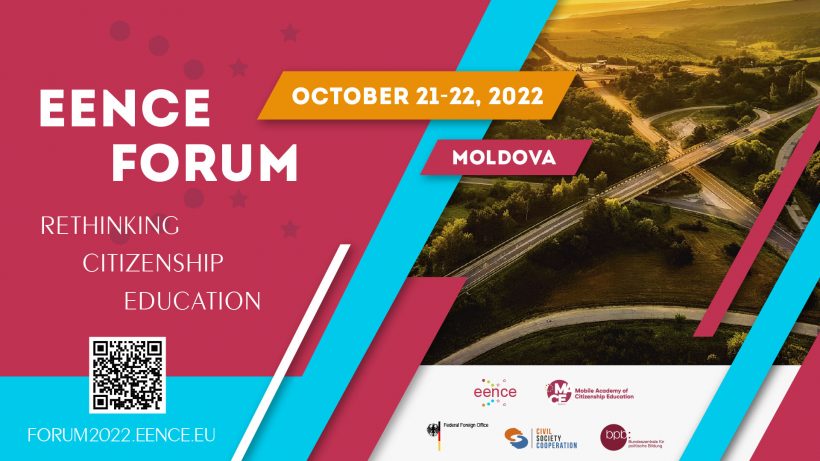The turbulent events of recent years in the Eastern Partnership countries have shown that the efforts of the providers of citizenship education and democracy in the region were not enough to stop the aggressive imperial policy and successfully resist militaristic propaganda.
Russian aggression in Ukraine, armed clashes in the Nagorno-Karabakh region, brutal political repressions in Belarus radically reshaped the situation not only in the region, but in the world as a whole.
Many citizenship education providers today are out of touch with their target groups, bled dry by the loss of their activists, and frustrated by the lack of a clear understanding of what needs to be done.
In addition, tensions between providers of citizenship education and democracy from different countries of the region also seriously increased against the backdrop of the war.
Civil society providers in the region are raising new questions, including:
1. Should the representatives of the civil society institutions of the EaP region come together or does this “holding hands” only hinder the development of civil society in each of the countries?
2. What are the priorities of citizenship education and how to implement it during the war and after the war?
3. What should be citizenship education to resist information wars?
4. What should be an inclusive citizenship education in regard to recent socio-political developments worldwide as an urgent response to various vulnerable groups including IDPs’ refugees, migrants etc?
5. The existing system of citizenship education has led to conflicts in the Eastern Partnership region and the war in Ukraine. What should be the new citizenship education?
6. What is the role of the international community in the defining and providing of the new approaches to citizenship education development?
Answering these questions requires a great deal of effort by leading experts to rethink the challenges and priorities of CS in the EaP region and worldwide, discuss new partnership mechanisms (including within the framework of the Network), and reach out to new target groups (including vulnerable ones) and ensure the inclusiveness of CS programs.
The EENCE Citizenship Education Forum is three days event aiming to rethink the challenges faced by citizenship education providers in the EaP region (armed conflicts, state pressure on CS actors, strengthening of dictatorship, threat of propaganda and hybrid war etc), prioritise citizenship education in response to these challenges, as well as share experience, demonstrate, develop the potential of the CE providers and discuss the further actions of the various stakeholders of citizenship education in the EaP region and expectations toward EU.
Aim of the Forum is to rethink the challenges faced by citizenship education providers in the EaP region (armed conflicts, state pressure on CS actors, strengthening of dictatorship, threat of propaganda and hybrid war etc).
Forum has the following objectives:
- To discuss the potential and challenges of citizenship education in regard to recent developments worldwide with the involvement of different stakeholders (practitioners, governmental representatives, administrative bodies, educators, providers of CE etc) and expectations from EU
- To provide a space and time to various stakeholders of citizenship education in EaP Region and Russia from one side and EU from the other side for practical exchange of views, practices, opportunities as well as future of citizenship education with colleagues
- To strengthen the citizenship education actors to re-thinking and re-defining the challenges and priorities of citizenship education and various issues of the promotion of democratic values among different target groups (especially – vulnerable ones) in times of escalation of violence in the region.
- To gather members of the EENCE network for wide and open discussion on the priorities, perspectives of its’ development as a response to the needs, challenges and situation.
The working languages of the Forum are English and Russian.
We will regularly update detailed information about the Forum on our webpage eence.eu.
Who are we waiting for at the Forum?
Representatives of non-profit, academic, international and government organisations, who are actively working and can demonstrate the effects of their actions in the field of citizenship education and adult education, are ready to share their work experience and actively participate in all Forum activities.
How to become a participant of the Forum?
If you would like to come to the Forum (October, 21-22) at your own expense, please fill out this form before October 1st!
EENCE Forum “Rethinking Citizenship Education” is organised by the The Eastern European Association for Citizenship Education and The Association of Children and Youth “Mostenitorii” (Moldova) with the support of the Federal Agency for Civic Education (bpb) at the expense of the German Ministry of Foreign Affairs.
The EENCE network was established in 2016. The network brings together more than 100 organizations and experts in promoting citizenship education and democracy in the Eastern Partnership countries and Russia.
Within the framework of the Network, about ten thematic groups work annually and implement their projects related to various aspects of civic education.
The network also hosted the Citizenship Education Summit (2019), and Citizenship Education Weeks (2020, 2021).


